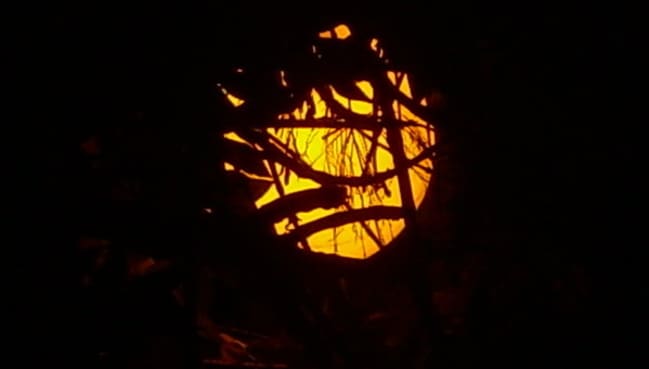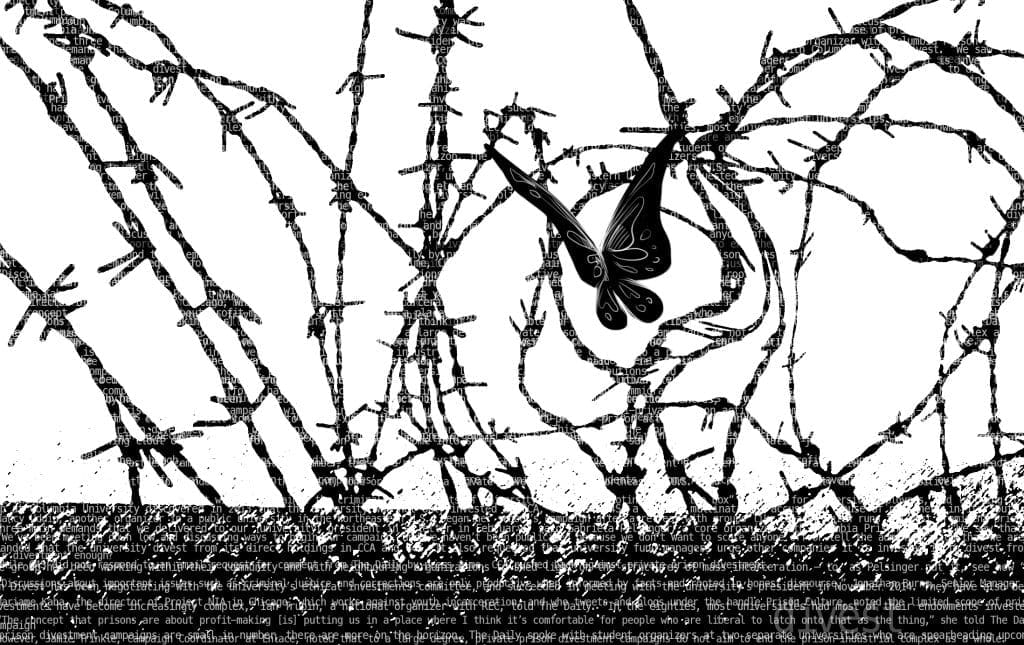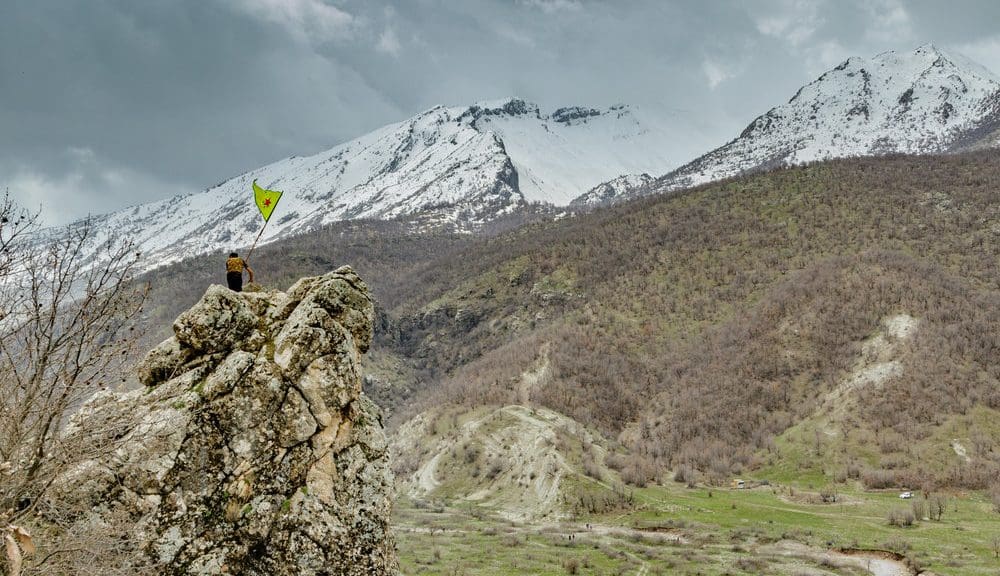Transcribed from the 1 April 2017 episode of This is Hell! Radio and printed with permission. Edited for space and readability.
This was a re-airing of an archived interview from 17 July 2004 for which there is no specific Soundcloud link. Interview audio is available starting at 2:17:00 of the full archive clip-show:
You don’t have to have a cure to offer a diagnosis, and I think it’s important to offer the diagnosis. I also think it’s important not to get so stuck on the diagnosis that you don’t remember the histories of things that have been cured.
Chuck Mertz: The book that we have Rebecca Solnit on for today is called Hope in the Dark: Untold Histories, Wild Possibilities, about the social justice movement, global justice movement, whatever you want to call it, what used to be called the anti-globalization movement (and is still called that by rightwing pundits here in the United States).
But also, the book that we had her on for before was Hollow City, and I really suggest that people check out that book as well. There’s great photography of the change that’s happening in San Francisco by Susan Schwartzenberg. It’s really interesting in San Francisco because they have such limited space, and there is such a huge growth of the income level there because of what is happening in Silicon Valley. This book was written in 1999 or 2000, right around then, and it really is fantastic. So if you are interested in Rebecca’s book Hope in the Dark, great, but Hollow City you should check out as well.
Good morning, Rebecca.
Rebecca Solnit: Good morning!
CM: Rebecca, like I was saying, this book is about the global justice movement—
RS: It kind of is, but it’s about much broader histories about how much the world has changed in ways progressives and people on the left don’t really take stock of, and about how change works. I just happen to be a wildly enthusiastic fan of and occasional participant in the global justice movement. I think it’s doing a lot of things right that previous movements have done wrong.
CM: I think you bring up something really important. We just had Larry Tye on the show last week. He wrote a book called Rising from the Rails about the rise of the black middle class in the United States, about the Pullman Porters and how they lifted up a section of their population into a so-called black middle class, and how they’re never given credit for what happened. We’ve had Jennifer Baumgartner on, who wrote a book called the Manifesta, and she talks about all the things that have happened due to feminism that feminism has never been given credit for.
So how do you still have hope when the progress is very slow and the people who are engaging in this activism to create something good for the future are never given credit for it?
RS: Sometimes they are given credit. But I think it’s almost inevitable that this stuff is forgotten. And you don’t do it for credit. If you do it for credit, you’re in the wrong line of business. I think, for example, we might be on the verge of questioning corporate personhood, the legal situation that gives corporations the rights of human beings. But in ten years if that’s challenged on a national scale, nobody in the senate, nobody on CNN is going to say, “Those furry little rascals on the margins and those Marxist professors were right after all.” You can’t do this because they’re going to say you were right. Nobody in the 1870s said, “Those fiery-eyed abolitionists were right about slavery after all.” We barely say it in 2004.
Gandhi has this wonderful line: “First they ignore you, then they laugh at you, then they fight you, then you win.” And after that, he could have said, “Then they forget you.” But that’s okay, because you’re really there because you want the slaves to be freed or women to have equal rights, not because you want people in power to make nice towards you. If that’s what you’re waiting for, you should cleave onto the mainstream to start with.
We don’t have good historical memory; we don’t have good history commemorations at all in this country. And activists, too, are very American in that they want some kind of diet pill program, instant results guaranteed now or your money back, lose two thousand pounds in ten minutes! People thought, okay, we’re going to go out and demand there not be a war in February, and if there’s a war in March we’re going to feel like total failures, rather than looking at what happened with the worldwide marches of tens of millions of people on February 15th, 2003, as part of a huge process of transformation that’s been going on for decades and whose results will continue to be felt for decades, but isn’t going to have an instantaneous, simple cause-and-effect relationship.
What I did in the book was try and trace these long, elaborate, complex relationships and try and recall some of the history. It took 75 years from the inception of the British anti-slavery movement to its success with abolition in the 1840s, and what was wonderful about the Quakers who took that issue on is that they didn’t give up, they didn’t get disappointed, they just kept going. And very few of them who were alive when the movement began were alive when it ended. But they won in a way that changed the world permanently, and really changed the discourse about freedom and equality in ways that all the official revolutions, the French and American revolutions hadn’t, and it really opened up the world for a worldwide condemnation of slavery that we’re still trying to work through. That’s an enormous victory.
Adam Hochschild has a book coming out about it this fall, but not a lot of people are running around saying, “Whoa, check out those Quakers in 1788!” But they won. Then we forgot them.
CM: This book has “hope” in the title, and it did give me some hope. A lot of times I just think that what I do on this show is pretty futile, because we do focus on the failures, on the problems that are ignored by the mainstream media. But at the same time we do ask our guests for a solution, because that was such an intense, reverberating criticism of the left leading into the war in Iraq. Everybody on the right, all the punditry on TV was saying, “They are telling us not to go to war, but they’re not giving us an alternate solution for what we should do with Saddam Hussein.”
We have had some people on our show say it’s not up to activists or people on the street to offer a solution, because they’re trying to get people knowledgeable about what’s happening. The next step would be offering a solution.
If you just give people the bad news without the solution, what do you end up with?
RS: I don’t think there’s always a happy solution. We know what the solution to global warming is, but we don’t have to be able to stop all carbon dioxide emissions to say that global warming sucks, and that maybe the US should ratify the Kyoto accords. You don’t have to have a cure to offer a diagnosis, and I think it’s important to offer the diagnosis. I also think it’s important not to get so stuck on the diagnosis that you don’t remember the histories of things that have been cured: the end of slavery; the changes in the status of African-Americans and women that you were just talking about; of all these endangered species that may be de-listed, like wolves and bald eagles, because they’ve bounced back.
The fact people are saying that it’s the end of this and the end of that is recognizing something that is really exciting and really scary, which is that the world is changing so profoundly we have no idea what’s going to happen next. The old shapes, the old forms no longer contain the possibilities. I think something wildly different is going to happen, and that leaves room for wonderful as well as terrible things.
I think it’s important to remember that sometimes we win and sometimes things get better, because that’s what keeps you able to fight these things that are going wrong without doing it the horrible traditional leftwing way: “Well, we’re going to lose, but we’re going to demonstrate how morally superior we are by fighting anyway.” Moral superiority isn’t very fun and interesting, and not much of an incitement for others to join in. It’s probably practical for making yourself feel important, but yeah.
I just really wanted to change the way people think about these things, to make them remember these things, and make them understand, too, that victories are not really the way you expect them to be, necessarily. I’ve been to a lot of these demonstrations, and most of them aren’t very interesting or effective. Sometimes they’re amazing and beautiful and transformative. And sometimes I think that maybe nothing happened, but maybe one kid I didn’t notice in the audience is going to go do something completely different with his life that we won’t notice until he’s 27, and he’s 17 now. He’s going to be the person who is really going to nail the argument on genetically modified organisms or something like that. You don’t really know what’s going to happen.
So there’s a kind of mysticism I’m interested in, of recognizing that you don’t know what the effects are going to be but you do it anyway. It’s as much about faith as about hope. And I collected a lot of those stories simply because I love those stories. There’s one about Women’s Strike for Peace (the women’s anti-nuclear movement in the early 1960s) that’s great but completely forgotten: one of the members testified about demonstrating against nuclear testing at the Kennedy White House, in the rain, feeling like she was totally wasting her time and nobody noticed, and what was the point? And many years later she heard Doctor Spock (not the outer space alien, but Doctor Benjamin Spock, who had become one of the most outspoken antiwar people in the country) saying that the turning point for him was when he saw this little group of women standing in the rain in front of the Kennedy White House. So that was one of the consequences of her action.
So you don’t really know what your effect is going to be, and you have to do it anyway. And sometimes you’re not going to have instant results guaranteed, which is what makes a lot of American activists grumpy. They think if you don’t get instant results, you’ve failed.
CM: Right now there are plenty on the left who are writing of the death of neoconservatism, that it’s over now because of the failure in Iraq. From the other perspective, from the right, we’re reading that the greens are sacrificing themselves on the “anyone but Bush” petard, and the Democrats are moving further to the right. We’re also hearing that it’s the end of the so-called anti-globalization movement.
But we’ve had people on this show say that neoconservatism isn’t going to die; it didn’t die during the nineties—it’s going to lay in wait for a new administration to come along that will embrace it again.
What do you think about the possibly premature obituary of the anti-globalization movement? Why do you think it’s still actually vibrant, not a failure, seeing as how many of its goals have not yet been achieved?
RS: I think it’s changed shape radically, because the world has changed shape radically. But one thing to keep in mind about the global justice movement is that we’ve won a lot. The World Trade Organization is in total disorder with what happened in Cancún in September, which was that all the developing Global South nations basically refused to get on board and cooperate. That was really epochal and really unexpected.
Then the idea was, “Well, we can’t get a global agreement, we’ll get regional agreements.” And then in November in Miami, the South and Central American nations refused to cooperate again.
And in South America particularly—Brazil’s been a leader in all of this—all these democratic governments have been elected. That’s a victory no one talks about. South America has gone from being the most dictatorship-dominated continent on Earth to being one that’s full of democratic insurrections and revolutions and new ideas about indigenous politics and justice.
The war and 9/11 have inflected it. But I think that the fact people are saying that it’s the end of this and the end of that is recognizing something that is really exciting and really scary, which is that the world is changing so profoundly we have no idea what’s going to happen next. The old shapes, the old forms no longer contain the possibilities. I think something wildly different is going to happen, and that leaves room for wonderful as well as terrible things, which is why it is, to say the least, a very interesting moment to be an activist.
There’s a kind of mysticism I’m interested in, of recognizing that you don’t know what the effects are going to be but you do it anyway. It’s as much about faith as about hope.
CM: This is one of the questions that has been confronting some of the left, some of the people within the global justice movement: What should we do? Should we throw the baby out with the bathwater, just get rid of the WTO and we’re better off? Or should we reform the WTO? Should we try to make it a place where trade can be negotiated in a fair way that is outside the jurisprudence, if you will, of the US government?
Which way do you think it should go?
RS: I don’t know, do you think we could have reformed the SS to run daycare centers? What I think is really important to remember about the WTO is that ten years ago, when it was just being formed, it looked like it was an unstoppable dynamo for corporations to rule the world and nothing was going to get in its way.
Then Seattle happened, and that was a little hitch in the path that slowed them down a little bit and made everybody sit up and pay attention and think maybe this isn’t inevitable. And now they’re really in shambles.
One of the things that happened recently—and I should say I’m not really a globalization expert, and my willingness to spout off live on the radio really bespeaks my lack of caution, but what the hell—I think one of the African countries recently brought a lawsuit for unfair trade against the US because we have these huge cotton subsidies that make US cotton cheaper than African cotton even though you know that unsubsidized Africans are producing much cheaper cotton. What the WTO was intended to do was essentially open up Third World markets to First World corporations, to “level the playing field,” which is something completely different from what developing nations have been saying, which is: “You want to open our borders for you to dump your subsidized agricultural produce and destroy our local agricultural economies, and we’re not going to stand for it.” That’s what they said very loudly in September.
Now they’ve been able to use the WTO to say, “Haha, you want a level playing field and totally open borders? Then we can screw you back. Take this on your cotton subsidies.” And the WTO ruled that cotton subsidies were unfair free trade practices. So it gets really interesting.
The WTO doesn’t look so fun and interesting to the First World anymore, when it turns out that it can benefit the developing nations more than the developed. So it’s because of those reasons, too, that the WTO has become less relevant and fallen into disarray, and it hasn’t become what we thought it was going to be, which was this one-world corporate government, this world in which corporations acquire the rights of human beings and human beings lose all the rights they once had, as though some other life form had taken over, like one of those 1950s science fiction movies, except the creatures that land on Earth are just giant legal constructs taking over. But I digress.
CM: You write, “News is about what went wrong, so when things go right, they’re ignored.” And you were talking about how so many of the transformations that happened due to the global justice movement happened so subtly that you just don’t even know, and you just have to sit back and take a little bit of time and be a little bit more patient, and maybe these good stories can actually come to the forefront, and maybe it won’t just be bad news that’s coming out.
But often the right wrongs are ignored, and the wrong rights are covered. In other words, the good news that we cover, unfortunately, is a kitten swimming six miles off the shore of Florida. And the bad news that we cover is stuff that seems to be out of our control, or just a crime in your neighborhood.
How can we make it so the right bad news is covered and the right good news is covered?
RS: Now we’ll get into a whole discussion about corporate media. But I think one of the victories of the last decade that has to do with internet is that alternative media has become more and more of a powerful presence in this country: more and more people get their information from the so-called alternative media, so the fact that everything else is owned by General Electric and Rupert Murdoch doesn’t matter so much.
But I also think that good news is often very incremental and it doesn’t look like news. News is when an oil spill happens. News is not when a population of formerly endangered wildlife resurges; or on the bad news side, when GM crops get out of control and pollute corn in Mexico. Good news is when everybody in Europe is so informed about genetically engineered food that they demand it be labeled, as a result of which no supermarkets will carry it, as a result of which it’s effectively banned in Europe. The one story about that that’s really made the news is that Monsanto closed their European offices.
Bad stuff is often very violent. Good stuff is often very incremental. That doesn’t add up to things that look like news, but it does add up to history, and does add up to the world we live in. I think that those kinds of things—changes in rights, changes in consciousness, changes in how people make changes—have happened to an extraordinary degree in the last forty years. And they keep happening on a lot of fronts. And that’s the stuff that—as a historian and not as a news reporter—I’m trying to call people’s attention to in Hope in the Dark.
CM: I was saying earlier that Seattle was not created in a vacuum. There were events that led up to the events in Seattle in November of 1999. There were two recent events that, to me, were earth-shaking events but got very haphazard, scattershot coverage in the press. I just want to touch on these two events very quickly before we go.
First of all, what do you think will be the legacy of February 15th, 2003—the eleven to thirty million people taking to the streets against the war? What will happen in the future that will be impacted by those thirty million people going into the streets?
RS: I’m not really sure. It’s only sixteen or eighteen months later, and it might take ten or twenty or thirty years to estimate that. But I think it had a lot of impacts. One thing is that the whole nature of the war changed because of pressure by citizens all over the world. A number of countries did not join in, countries like Spain have withdrawn. The war began at a different time and was fought in a different way than if there had been no outcry.
But I think what was also revealed was an enormous unprecedented power, partly because of electronic communications, to have this global movement, to have unarmed citizens take power and make statements and change the world. It happened on all seven continents, including the scientists in Antarctica. They also participated. To me it really suggests not that what it did was important but that what its possibilities could be is important. This kind of power will continue to influence events as history continues to unfold, and particularly if people can keep their hopes set on the distance, on the long term effects of things, on the strange ways that things unfold, on the idea that maybe we don’t know what the consequences are yet and we just have to keep doing it anyway.
There were hundreds of Mexican police there, expecting the activists to charge, but they did this amazing thing instead: the Korean farmers tied ropes around the fences; the women and other activists cut the fences into pieces; and then the women pulled the fences down, and then everybody just danced in this suddenly open space.
CM: Because you do such a great job of it in the book, Rebecca, why don’t you tell folks what happened in Cancún? What did you see?
RS: I wasn’t in Cancún, which I think was one of my really big mistakes of late. I didn’t quite get it together to go, and I was worried that it was going to be really violent, and my Spanish is pretty primitive, so I would have been this confused gringa in the line of fire. But I read the accounts and talked to a lot of people and followed Indymedia Cancún daily, read Peter Rosset’s wonderful reports. And it was truly extraordinary.
Activists were not allowed near the conference, which was on that weird hotel strip of Cancún. Rather than constantly trying to march to the WTO site, they essentially said, “Where we are is where history is going to be made; where we are is where the statements are going to be made.” And they were confronted with fences, but the media came to them. And they did extraordinary things.
A lot of what happened wasn’t so much the demonstrations but the communications between the demonstrators on the outside and the non-governmental organizations and developing nations on the inside. There was a real sense of coordination, that this was all the same effort. When activists were doing these brilliant, beautiful, moving things on the outside, and occasionally infiltrating into the tourist district and doing things at the WTO site, on the inside, Brazil, led by Lula (the trade unionist ex-metalworker who is now president), organized what was called the Group of 20 and then the Group of 20+, a coalition that included India and China. Once you’ve got India, China, and Brazil, you’ve got a pretty significant portion of the world’s people represented.
So these twenty nations, including a lot of African and South American nations, stood up and said, “We’re not going to open up our borders to your agricultural dumping and do everything you want when you’re not meeting our demands.” There was this amazing moment in the talks when the spokesperson for the Group of 20 from Kenya basically stood up and said, “These talks are over. This is another Seattle.” And a huge number of delegates walked out, and the talks just completely collapsed.
Thanks to cellphone technology, word got around from inside to outside, and the activists began celebrating, and did this amazing ritual where they literally pulled down the fences that were supposed to keep them out, and there were hundreds of Mexican police there, expecting them to then charge, but they did this amazing thing: the Korean farmers tied ropes around the fences; the women and other activists cut the fences into pieces; and then the women pulled the fences down, and then everybody just danced in this suddenly open space. They didn’t try and invade. They weren’t looking for confrontation. They really seemed to understand how to make it more of a carnival and less of a battle. So I think they won a kind of symbolic activist victory, and at the same time that they had won this huge political victory on the inside.
It was an enormous shift in the direction that the world was taking. It happened almost on the second anniversary of September 11, it happened I think on September 13, and of course it got almost no news coverage whatsoever in the US. A few stories in places like the New York Times suggesting that this was really bad for international trade in the business section, and that was it.
CM: You write about the classism of the 1960s left. You were raised to dislike “rednecks and white trash,” and working people were often looked down upon by the 1960s left.
What happened to the 1960s left that led them into this position where they could then later be labeled as elitists by the right? And also, has the left overcome this problem? What is the state of the left and the working class working together?
RS: This is one of the problems with telling history: it wasn’t the whole left. I think that a lot of the anti-Vietnam left and white civil rights activist left—there’s still a lot of residual resentment about how they conflated all white Southerners with this kind of redneck racist Bubba. And they didn’t really look more deeply, and didn’t really develop a more complex view of who those people might be and what their solidarities and possibilities might be—and actually that they were “us” anyway. They weren’t “them.”
I don’t know if that makes sense. It’s early morning here in San Francisco. But there were other lefts that were doing labor organizing, there were other lefts that were rising up out of farm workers and out of the South. And I think that what’s much more evident now is that there are many, many versions of progressivism, and some of them are really annoying and separatist and exclusionary. Some of them are entirely the opposite.
Similarly, there’s no record of women burning bras—I think one bra was burnt in the sixties—and there’s no record whatsoever of soldiers being spat on as they returned from Vietnam. That’s always the image we have. I think that in the antiwar movement this time, we were very clear that the US soldiers were not perpetrators, they were victims; we were in solidarity with them; we wanted them home. We weren’t going to buy into those binaries where if you’re not with us you must be against us. That’s George Bush’s binary.
I think there’s been a lot more sophistication, a lot more elegance about recognizing how the world is organized, and it doesn’t have to be black and white; it doesn’t have to be binary; it doesn’t have to be “you’re either with us or against us.” We can build coalitions across differences, and we can respect those differences, and try and understand them. That’s a lot of the work, and when we do that work, we’ve already succeeded in making the world a little bit more peaceful and a little bit more cooperative and a little bit more wide open.
CM: Rebecca, I really appreciate you being on the show again.
RS: My pleasure. Take care.





